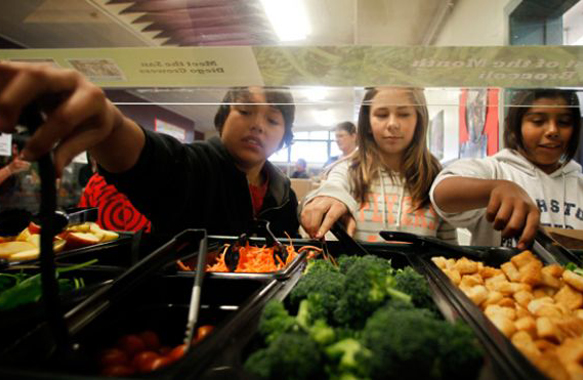Photograph; School Children in meal line. | Credit Reuters
Adults, this may be a necessary lesson. Feed all the children for free, regardless of their family income, and you can save money and also end discrimination. The side-benefits are tremendous. The state would no longer need to subsidize a meal program. And did we mention, costly paperwork and staff time will not be wasted. Better food and an improved infrastructure in our lunchrooms, these too can be quite the savings! Imagine this; parents would no longer need to comb couch cushions for change or experience abundant stress. ‘Did I remember to pack a lunch or give my child cash?’ There are savings for all when a free meals program is implanted. Best of all, we can save the children! We can stop at least some of the class-insensitivity and better yet we can lessen the likelihood of physical and mental illness. Visualize it and then, America, let us make it happen! Feed the children. Feed the future and save real money.
All Chicago Students Will Get Free Meals This School Year
Starting in September, all students in the Chicago Public Schools system, regardless of income, will be given free school meals, WBEZ reports.
This will be the first year that all schools, including more well-off ones, will join in. The district had rejected participating in the federal program that allows high-poverty school systems to offer free meals to all students in 2011, but 400 schools participated last year.
Participation has already brought benefits to Chicago. The district no longer has to subsidize meal programs with its general fund money and it’s getting a larger federal reimbursement. The full expansion this fall should also reduce staff time spent tracking which students have to pay for meals and collecting the money.
“This transition will also allow us to improve quality of food and infrastructure in our lunchrooms, allowing us to redirect the dollars we no longer have to subsidize back to the classroom,” the district said in an email to WBEZ.
A number of other school districts have decided to participate in the hopes of seeing savings and cutting down on administrative logistics. Paperwork was costing Dallas about $300,000 a year before it decided to give all students free meals. Boston and Indianapolis are offering free meals for all, and schools in Illinois, Kentucky, and Michigan were the first to implement the program.
The switch also saves parents headaches and money. The challenges of filling out the paperwork kept many eligible families from enrolling and many fell just outside the income limits. Just half of the students eligible for free breakfast across the country actually get it. But in Boston, families just above the limits are now saving $230 per child each year for free breakfasts and between $405 and $455 per child for lunch. Meanwhile, in the schools in Illinois, Kentucky, and Michigan that have participated for two years, participation increased in free lunch by 13 percent and in free breakfast by 25 percent.
The programs can cut down on the stigma of some students being singled out for free or reduced meals while others pay. Some schools stamped the hands of those who couldn’t afford lunch if they didn’t have money. Others have thrown out students’ reduced-price meals if their account balances ran low.
Hunger is a big impediment to learning, and the programs can help ease the problem. Three-quarters of the nation’s teachers say that the have students who regularly come to class hungry and more than one in five children lacks steady access to food. Hunger has a big impact on cognitive and social development while leaving children far more susceptible to mental illness.












Leave A Comment